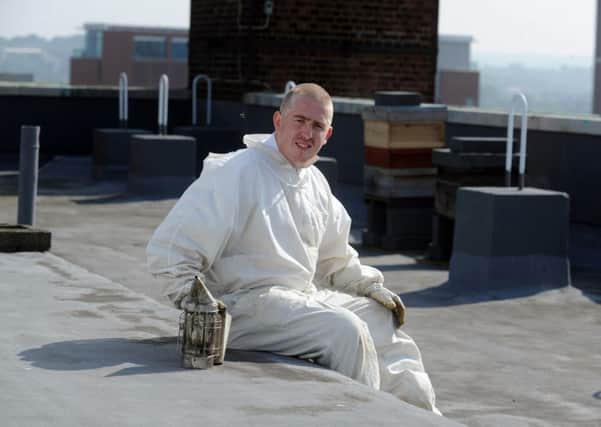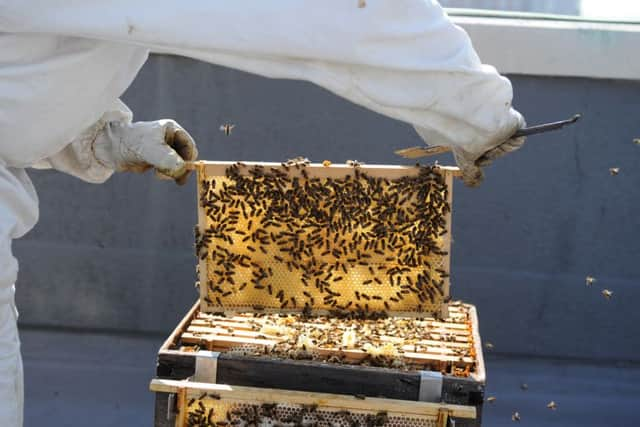Bees on their knees: Honeybees come through '˜worst' winter in decade in Leeds


It’s a stark fact there are now almost no honeybee colonies left in the wild in the UK. If you’re lucky enough to spot one on your travels, it’s odds on it’s come from what’s called a managed colony - that is, one looked after by a beekeeper.
When you consider that its also estimated a third of what we eat depends in some way the process of pollination - a job at which the humble honeybee is pretty much peerless - the problem seems obvious.
Advertisement
Hide AdAdvertisement
Hide AdThe decline of the honeybee is well documented and is blamed largely on the spread of the aptly named varroa destructor mite, which spread to the UK some 20 years ago and has been rife ever since. But while that might be the worst of the honeybee’s problems, it seems survival for what is simultaneously one of our most important and yet unregarded species, is anything but simple and the recent mild, wet winter, did little to help their plight.


Chris Barlow, from the Leeds Beekeepers Association, explains: “It’s one of the mildest winters we’ve had in many years and very wet too and in those conditions, the bee hive just does not shut down as it normally would. Instead of resting and conserving energy, the bees carry on working, the hive continues to make young and the fear is they just run out of food.”
Any beekeeper worth their salt will usually leave enough honey in a hive - 40 to 50lbs will allow them to overwinter - to ensure the colony comes through any cold spell.
However, in some cases, beekeepers may be forced to put in substitute food sources, such as fondant icing - yes, the kind you see on decorative birthday cakes, beloved of children everywhere.
Advertisement
Hide AdAdvertisement
Hide AdChris says: “It’s emergency food for them, it’s 80 per cent sugar and they’re able to easily digest it. Ideally, you want them to have honey but in a needs must situation, this is the next best thing.


“The problem with winter is you do not get as many flowers as summer and if it’s a mild winter, like the one we’ve just had, the bees just don’t stop, so they still need that food source. It also means the varroa mite continues to breed.
“This is the worst winter we’ve had in about five years and beforehand, we were fearful we might lose some of our colonies but thankfully, they have all come through okay.”
According to the most recent data, the UK has around a quarter of the bees is should have - that is, in part, down to the near complete destruction of wild colonies, which are deemed to he as effective, if not better than managed ones when it comes to pollinating. Indeed, insect pollinators are considered a necessary part of agriculture, to the extant that bees colonies are often ‘shipped in’ on demand.
Advertisement
Hide AdAdvertisement
Hide AdThere’s a financial cost to this too. When EU production linked subsidies for oilseed rape - even more in demand thanks to the growth in the biofuel market - were relaxed in 2005, prices rose by 65 per cent between then and 2010. While a litre bottle of olive oil might have cost 55p at the supermarket a decade ago, today it’s around the £1.50 mark.
The EU continues to subsidise biofuel production, which is only adding to the burden on bees - there simply are not enough to go around.
Nor are things likely to get any easier for the honeybee, as beekeeper of 40 years Dave Barrett explains: “There are a couple of threats on the horizon for bees, in the form of new species. We don’t have them in the UK yet but they have already spread to Europe and sadly, it’s probably only a matter of time before they end up here.”
He’s talking about the small hive beetle, which is endemic to sub-Saharan Africa and prefers sandy soils in which the young live but they have already spread to France and even Australia, which is renowned for its strict quarantine rules.
Advertisement
Hide AdAdvertisement
Hide AdThe other, perhaps outwardly more menacing threat comes from the Asian hornet, which looks like something out of a horror movie. It’s the world’s largest hornet, with a body length of 5cm and a wingspan of almost 8cm. It is capable of wiping out a 30,000-strong bee colony within a matter of hours. It is thought to have spread to France on a pot plant in 2004 and has been blamed for decimating honey production.
Dave would like to see two key changes, which he says would greatly assist the survival of the honeybee.
“I’d like to see a co-ordinated UK pollination strategy. One of the things which would help is if councils cut their grass less. This would save them money but if they were to cut late autumn, after wild flowers have gone to seed, this would ensure more flowers the following year. Leeds Council are pretty good at this but I’d like to see a national conversation.
“Another step would be for garden centres to label flower seeds as pollinator friendly.”
Advertisement
Hide AdAdvertisement
Hide AdWith all these factors affecting wild honeybees, members of the Leeds Beekeepers Association are keen to recruit new members.
Duncan Brearley, from the association, said: “We hold regular training days and we’d love to see more people getting involved.
“It’s a wonderful hobby and you generally get a lot out of it. The more people take it up, the better chance the honeybee has.”
FACTFILE
Leeds Beekeepers Association will be running a taster session on May 14 and a new beekeeper course on May 25; other courses run throughout the year
Advertisement
Hide AdAdvertisement
Hide AdThe group, based at Temple Newsam, has around 150 members and formed in 1943
Contact chair Katey Slater via email at [email protected] or vice chair Duncan Brearley on [email protected]
For more information, see the website: www.leedsbeekeepers.org.uk